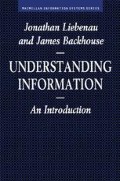Abstract
How can we come to know the underlying meaning, the truth, of some aspect of knowledge or of an act of communication? We might suppose that we come to know a “real world” of some description through discovering the workings of nature. However, the problem is that we can never be certain that the understanding we have is the same as that of the next person. This sort of problem has long plagued philosophers and is still important for us to confront when considering the character of information. The truth, it seems, is inaccessible. We can know what we believe, and especially so if that knowledge is in some way rooted in our familiar culture, but beyond that it is difficult to be confident of the absolute truth that is being communicated to us. But it is more than just a difficulty if we believe that this outside world is inaccessible to us.
Preview
Unable to display preview. Download preview PDF.
Suggested reading
Bloor, David, Knowledge and Social Imagery, London: RKP, 1976. An argument built from the mainstream of thought in the sociology of knowledge, applied to concepts of science and leading to the presentation of the “Strong Program” for the sociology of scientific knowledge.
Douglas, Mary, How Institutions Think, Syracuse: Syracuse University Press, 1986. A synthesis of Douglas’s writings, most usefully applied to institutions of various kinds, educational, commercial, political. At its root is a moralistic argument based on the notion that “for better or worse, individuals really do share their thoughts and they do to some extent harmonize their preferences, and they have no other way to make the big decisions except within the scope of institutions they build.”
Levinson, Stephen C., Pragmatics, Cambridge Textbooks in Linguistics, Cambridge: Cambridge University Press, 1983. One of a useful series of textbooks which covers in great detail the linguistic aspects of concepts of pragmatics.
John R. Searle, Minds, Brains and Science, Cambridge, Mass.: Harvard University Press, 1986. Based on the popular Reith Lectures of the British Broadcasting Corporation, this collection of essays takes the reader from the concept of cognition through arguments about whether computers can think, to an explanation of intentionality.
Author information
Authors and Affiliations
Copyright information
© 1990 J. Liebenau and J. Backhouse
About this chapter
Cite this chapter
Liebenau, J., Backhouse, J. (1990). Pragmatics. In: Understanding Information. Macmillan Information Systems Series. Palgrave, London. https://doi.org/10.1007/978-1-349-11948-6_3
Download citation
DOI: https://doi.org/10.1007/978-1-349-11948-6_3
Publisher Name: Palgrave, London
Print ISBN: 978-0-333-53680-3
Online ISBN: 978-1-349-11948-6
eBook Packages: Palgrave Business & Management CollectionBusiness and Management (R0)

